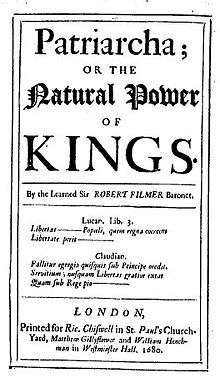Patriarcha
 | |
| Author | Robert Filmer |
|---|---|
| Language | English |
| Subject | Political philosophy |
| Published | 1680 |
| Media type | |
| ISBN | 978-1409952374 |
Patriarcha, or The Natural Power of Kings is a 1680 book by the English philosopher Robert Filmer.
Summary
Patriarcha provides a theory of absolute monarchy and the divine right of kings.[1] Filmer attacks what he sees as the two enemies of royal power, the Jesuits and the Calvinists, and states two royalist principles: divine right and the duty of passive obedience. He tries to show that the king's power is derived from the natural authority of parents, and that Adam was the first king. Borrowing from Thomas Hobbes, Filmer attacks conceptions such as contract and consent as explanations of political obligation.[2]
Scholarly reception
John Locke and others attacked what they saw as the absurdity of Filmer's views.[2] The first of Locke's Two Treatises of Government consists mainly of criticism of Filmer. Locke found Filmer's account of political authority unworkable, arguing that it could not be used to justify any actual political authority, since it is impossible to show that any particular ruler is one of Adam's heirs.[1]
Patriarcha remains Filmer's best known work. R. S. Downie considers Filmer's attacks on contract and consent as explanations of political obligation to be plausible, and finds it unfortunate that Filmer's belief in Adam's kingship has obscured them.[2]
References
Footnotes
- 1 2 Woolhouse 2005. p. 525.
- 1 2 3 Downie 2005. p. 302.
Bibliography
- Books
- Downie, R. S. (2005). Honderich, Ted, ed. The Oxford Companion to Philosophy. Oxford: Oxford University Press. ISBN 0-19-926479-1.
- Woolhouse, Roger (2005). Honderich, Ted, ed. The Oxford Companion to Philosophy. Oxford: Oxford University Press. ISBN 0-19-926479-1.